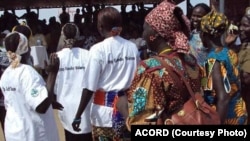JUBA, SOUTH SUDAN —
In the seven years that Lilian Dudu Michael has been educating the South Sudanese about gender violence, she has learned that victims often suffer in silence.
“There is one case...a woman was raped and they reported to a social worker. The social worker wanted to take that case to the police, but then the parents of the lady said they do not want that case to be reported because it would really spoil the reputation of their daughter and also their family,” Dudu said.
South Sudanese women and men gathered together recently in Juba for a dialogue on gender-based violence, set up by two NGOs who hope to raise awareness of a scourge that affects as many as one in three women worldwide.
The Agency for Co-operation and Research in Development (ACORD) and Community Empowerment for Progress Organization (CEPO) hope the dialogue between the men and women will raise awareness of gender-based violence and lead to action in communities to fight against it.
According to a 2008 study conducted in three South Sudanese counties by ACORD, most women do not report cases of violence against them.
The study blames, among other things, traditions and poverty as major causes of violence mainly against women.
Another study, conducted by CEPO in six counties of Central Equatoria state in 2011 found out that women do not bring sexual violence cases to the authorities for fear of reprisal by their husbands, and because of the high cost of legal proceedings.
Idiongo Jilda Eliseo, who is from Eastern Equatoria state, said some women endure beatings from their husbands for fear that, if they get divorced, their families would have to pay back expensive dowries.
Jilda suggested offenders should be punished if violence against women is to be eradicated.
“There is one case...a woman was raped and they reported to a social worker. The social worker wanted to take that case to the police, but then the parents of the lady said they do not want that case to be reported because it would really spoil the reputation of their daughter and also their family,” Dudu said.
South Sudanese women and men gathered together recently in Juba for a dialogue on gender-based violence, set up by two NGOs who hope to raise awareness of a scourge that affects as many as one in three women worldwide.
The Agency for Co-operation and Research in Development (ACORD) and Community Empowerment for Progress Organization (CEPO) hope the dialogue between the men and women will raise awareness of gender-based violence and lead to action in communities to fight against it.
According to a 2008 study conducted in three South Sudanese counties by ACORD, most women do not report cases of violence against them.
The study blames, among other things, traditions and poverty as major causes of violence mainly against women.
Another study, conducted by CEPO in six counties of Central Equatoria state in 2011 found out that women do not bring sexual violence cases to the authorities for fear of reprisal by their husbands, and because of the high cost of legal proceedings.
Idiongo Jilda Eliseo, who is from Eastern Equatoria state, said some women endure beatings from their husbands for fear that, if they get divorced, their families would have to pay back expensive dowries.
Jilda suggested offenders should be punished if violence against women is to be eradicated.





